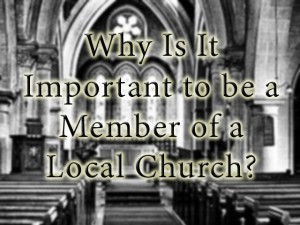In Acts 2:42 ff. immediately following the indwelling of the Holy Spirit upon all believers, the believers begin to meet (daily). Luke rarely mentions the Greek word εκκλησία (church) in the book of Luke, but mentions it over 24 times in Acts. So, the church came into existence after Pentecost.
While we don’t know exactly what membership in the apostolic church entailed, it was certainly for the purposes of edification, prayer, service, and, as can be seen particularly in Acts 5, discipline. Christianity is a corporate matter, and the Christian life can be fully realized only in relationship to others.[1]
The early church shows us that members invest their passions, service, resources, and relationships for the kingdom through the local church. They commit to a holy life characterized by integrity and confession of sin. The commitment to membership means active participation in ministry, in worship, in fellowship, and in service for the mission of the church, along with generous giving and evangelistic living.[2]
In the handling of Ananias and Sapphira (Acts 5), as well as Paul’s instructions to the Corinthians (1 Cor. 5:1-5) and the Galatians (6:1) regarding the treatment of sinners, argues for a careful monitoring by the group of the spiritual condition and conduct of the members. While prefect purity of the membership is ideal which cannot be realized within this life (Matt. 13:24-30), open unbelief and sin are not tolerated.[3] Before we get too far into what the church should be doing, let’s look at what the church is not, and then give a clear definition.
Defining the word “Church”
What the church is not, as indicated by Mark Driscoll, “The church is not a holy building in which spiritual meetings take place. The church is not a Eucharistic society through which God dispenses grace by means of the sacraments and a duly authorized and empowered hierarchy of bishops and priests operating in unbroken succession from the apostles. The church is not the moral police force of a society seeking mere behavioral change through legislation. The church is not a weekly meeting where people gather to do spiritual things.â€[4]
Driscoll goes on to give a definition of the church; “The local church is a community of regenerated believers who confess Jesus Christ as Lord. In obedience to Scripture they organize under qualified leadership, gather regularly for preaching and worship, observe the biblical sacraments of baptism and Communion, are unified by the Spirit, are disciplined for holiness, and scatter to fulfill the Great Commandment and the Great Commission as missionaries to the world for God’s glory and their joy.â€[5]
The Bible speaks of church membership in relational terms – as members of one body and as members of the household of God – so that God’s people live as a gospel community and help one another grow in Christ and reach others for Christ.[6] There are no “Lone Ranger” Christians in the Bible, and there should be none today.
Why Join a Church?Â
Why should I become a member of a local church? I’m already saved and a part of the body of Christ (universal) so does it even matter if I am a member of a local church? Well, it does matter because we do become a part of the family of God when we receive Christ, and the actual expression of that is found in the New Testament local church. There is not one Christian mentioned in the New Testament who was not connected to a local church.
Rick Warren has written, “Many Americans Christians are what I call “floating believers.” Anywhere else in the world, being a believer is synonymous with being connected to a local body of believers‑‑you rarely find a lone‑ranger Christian in other countries. Many American Christians, however, hop from one church to another without any identity, accountability, or commitment. This is a direct expression of America’s rampant individualism. They have not been taught that the Christian life involves more than just believing‑‑it also includes belonging. We grow in Christ by being in relationship to other Christians. Romans 12:10 says, “Be devoted to one another in brotherly love.”
This same lack of commitment to any one church can be found in the youth of today as well. There is a phenomenon of youth jumping from one youth group to another in order to “get their needs met” or to the one that’s “cool” right this minute. They don’t tithe, serve, or have any formal ties to any one youth group. Without this commitment there is no accountability, few relationships where they serve and love one another, encourage each other toward holiness, or have a sense of responsibility toward the group. They have learned this from their parents who either model it for them, or enable them to express this behavior of selfishness.
C.S. Lewis once wrote an essay on church membership, reminding us that the word membership is of Christian origin, but it has been taken over by the world and emptied of all its original meaning. Today, most people associate the term membership with paying dues, meaningless rituals, silly rules and handshakes, and having your name on some dusty roll.
Paul, however had a very different image of membership. To the Apostle Paul, being a member of the church did not refer to some cold induction into an institution, but rather it meant becoming a vital organ of a living body (Rom. 12:4‑5; 1 Cor. 6:15; 1 Cor. 12:12‑27). Any organ that is detached from the body will not only miss what it was created to be, it will also shrivel and die quickly. The same is true for Christians that are uncommitted to any specific congregation.”
Nowhere in Scripture does it imply that salvation comes through membership in any church. Luke says of the early church, “And the Lord added to their number day by day those who were being saved†(Acts 2:47). When questioned about salvation, the apostle never suggested that it depends upon connection with a group of believers. When Peter and others were asked, “Brethren, what shall we do?†(Acts 2:37), the reply was, “Repent, and be baptized every one of you in the name of the Jesus Christ for the forgiveness of your sins†(v. 38). Peter’s message was the same in Acts 3:12-26 and 4:7-12. Paul’s reply to the Philippian jailor’s question, “What must I do to be saved?†(Acts 16:30) was straightforward: “Believe in the Lord Jesus, and you will be saved, you and your household†(v. 31).[7]  So while there is no link between salvation and membership, there is a direct link between sanctification and membership in the local church.
Benefits of Membership Â
It is important to realize that there are several benefits that can come to you through church membership. The benefits include:
1) It provides a spiritual family to support and encourage you in your walk with Christ (Gal. 6:1‑2; Heb. 10:24‑25).
2) It gives you a place to discover and use your gifts in ministry (I Cor. 12:4‑27).
3) It places you under the spiritual protection of godly leaders (Heb. 13:17; Acts 20:28‑29).
4) It gives you the accountability you need to grow (Eph. 5:21).
5) It gives you a place where there are people who will share the burdens of life through prayer, love, sharing, support, and encouragement (Gal. 6:2).[8]
As long as you are not committed to a local church body through membership, you are not able to live the Christian life God intends for you live. Even if you “attend” a church for a long time, it is the formal commitment on your part to the church and the church toward you, that creates a bond of accountability, encouragement, and ministry in Christ’s name. [9]
[1] Acts 20:28-31; Ephesians 4;11; 1 Timothy 3:2; 1 Corinthians 11:18 ff.; 1 Timothy 5:16; 1 Corinthians 16:1.
[2] Mark Driscoll. Doctrine (Wheaton, Illinois; Crossway) 322.
[3] Millard Erickson. Christian Theology (Grand Rapids, Michigan; Baker) 1048.
[4] Driscoll, 307.
[5] Ibid.
[6] Romans 12:4-5; 1 Corinthians 12:12-27; Ephesians 2:18-19; 3:6; 4:25; 5:29-30.
[7] Erickson,1047.
[8] Rick Warren, 101 New Members Class Manual.
[9] Other suggested books to read on this topic that were not mentioned in the footnotes;
Bible Doctrine, Wayne Grudem (Grand Rapids, Michigan; Zondervan) 1999, and Biblical Foundations for Baptist Churches, John S. Hammett (Grand Rapids, Michigan; Kregel) 2005.

